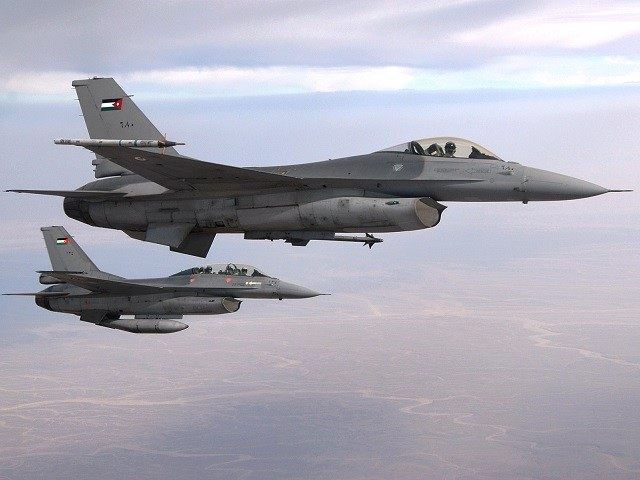Jordan’s government is executing their vow to “eradicate” the Islamic State (ISIS or ISIL): hundreds of sorties later, Jordanian military officials believe that Abu Bakr al-Baghdadi, the head of the terrorist group, is in hiding because he is “frightened” that an airstrike will kill him.
“He is frightened by what we did in the last three days,” said Maj. Gen. Mansour al-Jabour, a leading official in the Jordanian mission, to NBC News. “If [al-Baghdadi] is not frightened let him show himself to us and he’ll see what we can do against him.” al-Jabour added that the Jordanian military has placed al-Baghdadi “at the top of our list” to kill.
The Jordanian military has increased its participation in the U.S.-led coalition airstrikes against ISIS significantly since the terror group released a video of the death of pilot Muath al-Kaseasbeh, who the terrorists burned alive on film. King Abdullah II responded to the video vowing revenge for al-Kaseasbeh and his family, quoting Clint Eastwood’s film Unforgiven, according to some reports. Some even speculated that the King was personally flying missions in Syria, though those reports have been denied by official sources.
Since Jordan joined the anti-Islamic State coalition in September, it has flown 946 sorties, according to the Wall Street Journal. The newspaper reports that Jordan completely destroyed 56 ISIS targets since Thursday. In addition to lending a fleet of aircraft, the U.S. has provided almost two dozen additional air vehicles for support.
The campaign appears to be having some effect. Reuters reports that ISIS jihadists are leaving some key areas in northern Syria that have become the focal point of the airstrike campaign. The reports, from the Syrian Observatory for Human Rights, claim that the Muslim group has had to redistribute its jihadist soldiers to combat attacks from both Kurdish forces on the ground and coalition strikes in the air, particularly in northern Aleppo province. This success follows news that ISIS has been completely eradicated from the Syrian-Turkish border town of Kobani, for which ISIS fought a bloody weeks-long battle.
The response to Jordan escalating its participation in airstrikes, despite the news of a retreat, has not received universal praise. For one, the government of Syria, which ISIS considers an enemy, has condemned further encroaching into their territory by Jordan, implying the airstrikes violated their nation’s sovereignty. “We will not allow anyone to violate our national sovereignty and we do not need any ground troops to fight Daesh,” said Syrian foreign minister Walid al-Moallem, referring to the group by an Arabic acronym.
“The Syrian Arab government is fully capable of fighting Daesh valiantly and we don’t need any other troops,” he continued in a press conference held this week. Al-Moallem had even harsher words for Jordan, accusing them of fighting only ISIS and not the al Qaeda-affiliated al-Nusra Front. The Associated Press summarizes Syria’s complaints: “allowing ‘terrorists— a government term for all opposition fighters seeking to topple Assad — to cross into Syria after training them in camps in Jordan [is] overseen by the United States.”

COMMENTS
Please let us know if you're having issues with commenting.